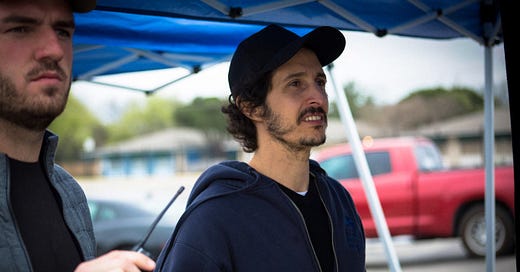Heartland: North Putnam director Joel Fendelman
The director of the documentary about life in a rural Indiana county talks about the importance of remaining a "fly on the wall" to his subjects.
For Heartland Film Festival schedule and tickets, please click here.
“North Putnam” is an ode to the rural community about an hour west of Indianapolis. It’s a place deeply tied to the earth, where even the teachers and their students do farm chores once school is done.
Director Joel Fendelman took an unusual approach (these days) to the documentary form: rather than a series of “talking head” interviews or political polemic, he prefers to point his camera at his subjects and let them tell their own stories. He took time out to talk to Film Yap about his cinematic journey.
Film Yap: The obvious question most people would ask is: What made you want to chronicle a rural corner of Indiana?
Joel Fendelman: I love exploring new worlds, learning about people and cultures unlike my own and bridging the gap between the “other” and myself especially in such a contentious time in our national landscape. So, when I was offered an opportunity to spend time in a rural corner of Indiana it seemed like a perfect intersection of the specific intentions and values in my filmmaking.
FY: Tell us a little about your own background and journey as a filmmaker.
JF: I grew up in Miami and spent most of my adult life in New York City, so rural mid-western culture is not my experience in life. However, I’ve also made several films with cultures and landscapes that were also very far from my experience whether it be immigrant communities in Brooklyn or Filipino domestic workers in Singapore. I think it has become skillset that I have become quite good at, where I can walk into worlds different than mine with curiosity and compassion.
FY: How long did you film in North Putnam and how did you get connected with your subjects?
JF: We filmed for about 1.5 years so that we could capture a full school year and the beginning of a new one. The subjects of the film came from a variety of methods. Sometimes school administrators would recommend families to talk to, other times we would just meet people while filming and others the producers knew prior to the filming. In fact, the nephew of Anthony Mullis our Sound mixer/producer/composer is one of the children in the film.
FY: The view of the school system shows how in places like this it operates as the de facto heartbeat of the community. How did you see the controversy over "indoctrination" of students playing out while filming?
JF: It was quite fascinating to see how the controversy played out while filming. I was able to see in a first-hand way how the whole controversy was based on fearmongering from national right wing media. However, I also saw how the school admin didn’t help the situation by seemingly brushing it off as nonsense. Although I completely understand that response, I could see how it further led to distrust from some of the parents.
FY: Your approach to the documentary form is very old-school -- the "fly on the wall" -- that you don't really see much anymore. Why did you choose this M.O.?
JF: I felt like it was the only way to tell this story for it to be accessible to people on many different sides of the aisle. I wanted to approach it from a place of neutrality, allowing the audience to come to their own conclusions. We wanted this film to be a conversation starter that allowed for nuance and different shades of gray.
FY: What do you hope people take away from "North Putnam?"
JF: I hope people walk away with a greater sense of compassion and understanding for the community and culture of the rural mid-west. Especially for coastal urban populations that might be quick to overlook these areas, I want them to see the complexity and rich culture that exists there. I also want people to take away the value of a good public school system and that what makes is good is having administration and faculty that truly care.
FY: What's next for you?
JF: I’m finishing up a documentary about sexual abuse in elite New England boarding schools and beginning one about a spiritual advisor for inmates on death row.




